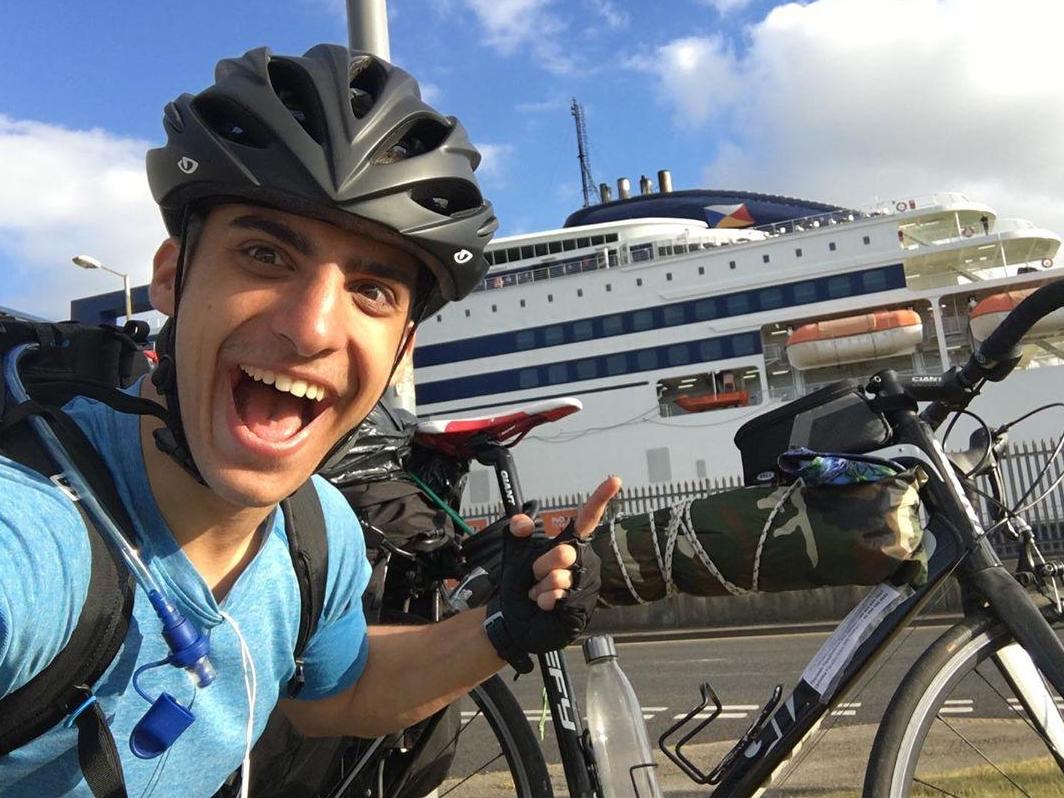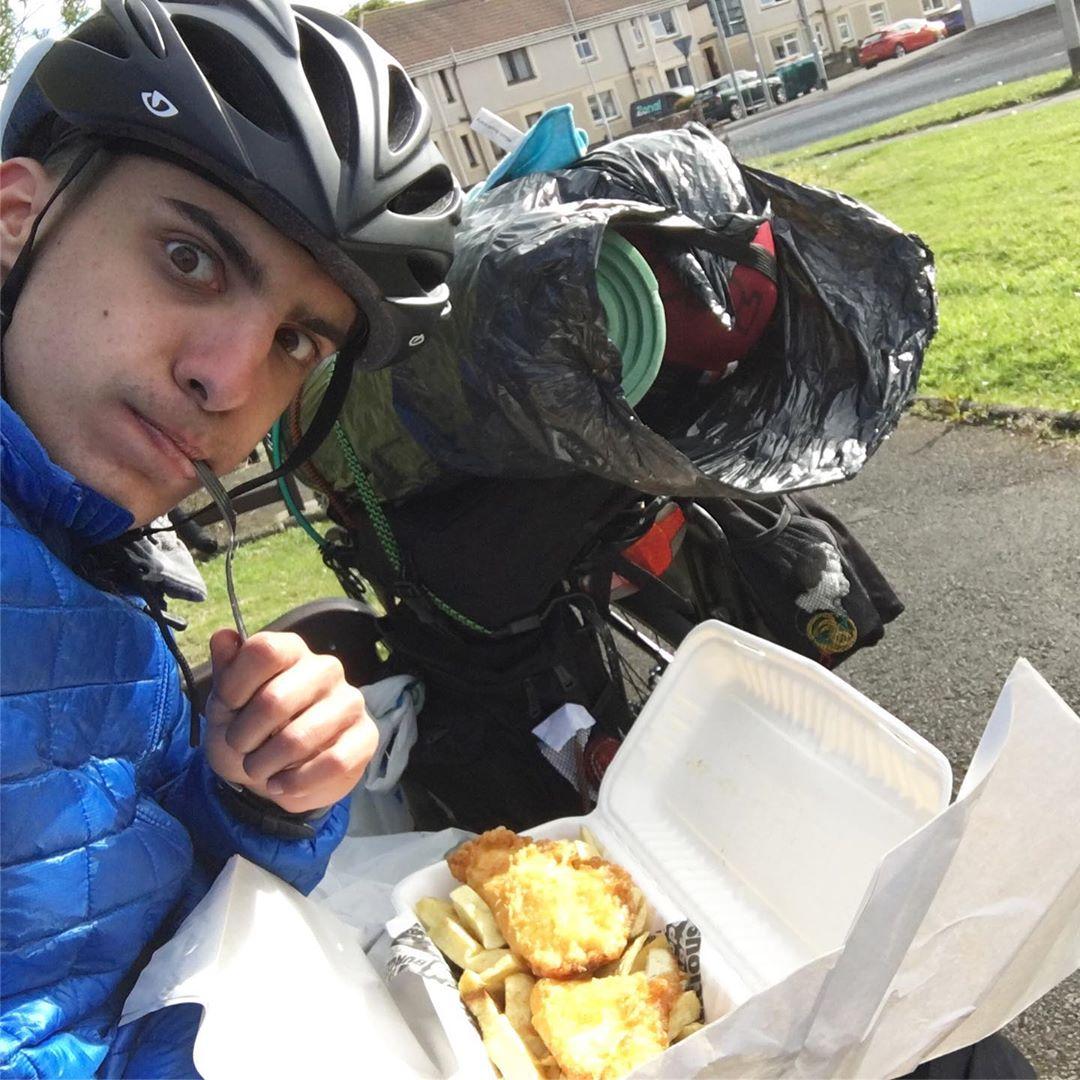‘What am I doing with my life?’: The Greek student who cycled home from Scotland in lockdown
Iliana Magra spoke to the Greek student who had to find his way home from Scotland after flights were cancelled

Your support helps us to tell the story
From reproductive rights to climate change to Big Tech, The Independent is on the ground when the story is developing. Whether it's investigating the financials of Elon Musk's pro-Trump PAC or producing our latest documentary, 'The A Word', which shines a light on the American women fighting for reproductive rights, we know how important it is to parse out the facts from the messaging.
At such a critical moment in US history, we need reporters on the ground. Your donation allows us to keep sending journalists to speak to both sides of the story.
The Independent is trusted by Americans across the entire political spectrum. And unlike many other quality news outlets, we choose not to lock Americans out of our reporting and analysis with paywalls. We believe quality journalism should be available to everyone, paid for by those who can afford it.
Your support makes all the difference.Nearly a month into the coronavirus lockdown, Kleon Papadimitriou, a Greek student in Aberdeen, Scotland, was feeling homesick.
Restless – and with flights to much of Europe cancelled – he was looking for a way home to Athens. His father joked that he could simply walk, and a light bulb went on. What if he cycled?
“I wanted something big, a project for the year,” the younger Papadimitriou says on the phone.
What followed was a cycling journey across Europe that spanned five countries, more than 2,000 miles and 48 days, with Papadimitriou finally arriving home in Athens late last month.
Papadimitriou, 20, studies electrical and electronic engineering at the University of Aberdeen, but when classes stopped, he found himself with a sudden surplus of time and energy. So, turning the strictures of the pandemic into an opportunity and motivation, he began planning his trip by bike across a coronavirus-hit Europe.
Less than a month later, on May 10, he was packed and ready to leave Aberdeen, in northeastern Scotland, with a handful of essential supplies. Making the cut: phone, power bank, some tools, two changes of clothes, a raincoat, a windbreaker, a tent, sleeping bag, food for four days and water. A book he had wanted to bring took up too much space, so had to be left behind.
In the beginning, he had daily regrets about his self-inflicted odyssey, he said. His first day on the road proved trying.
“My parents did not know where I was, I started crying,” he says. “I didn’t know where I’d stay for the night.”
He asked a pizza delivery man, who directed him to a nearby grove, where he regrouped, had some food and called his parents.
“I learned a lot of things about myself, about handling myself in difficult situations, when I have low morale, and how important some relationships are,” he says.
Besides getting lost, the first days of his trip were full of difficulties that included flat tires, bad weather, and steep climbs. When he set out, he planned to cover about 125 miles a day. But he soon realised that such a goal would be unlikely. Instead, he covered about 75 miles a day at most.
A week into his journey, he arrived at a friend’s house in Leeds, in northern England, where he stayed for two days. He also took his first shower since leaving Scotland. Departing again was a challenge.
“I was thinking ‘God, what am I doing with my life’,” he says.
But his spirits lifted when he reached his first milestone: boarding a ferry from Britain to the Netherlands, and crossing his first national border. “It was the point of no return,” he says.
His parents met him in Patras, where he was tested for the coronavirus – the result was negative – and the three of them cycled the final stretch together
Four days later, and after staying at campsites, he made it to Germany. Friends of friends let him stay over, though most did not want him inside their houses because of the coronavirus, so he set up his tent in their gardens. He was being careful around people too, wary of getting sick while on the road.
He made it to another important milestone: Stuttgart, where his grandmother lives.
“It was very important to me, it was like a checkpoint,” he says. “I hadn’t seen my grandma for so many years, and the only thing I cared about was, if something were to happen to me, I didn’t want it to happen before I got to Stuttgart.”
He stayed with her for a week to rest and refuel, his first time eating a proper homemade meal after weeks of a meagre diet.
After Germany came Italy, where businesses were gradually reopening after the first wave of the pandemic. He had a pepperoni pizza and a beer in the Italian Alps before heading to Venice, where he stayed for a day. Then it was on to Ancona, a seaside city on the Adriatic coast, where he boarded a ferry to Patras, in the Peloponnese region of Greece.

“The moment I believed I could make it was when I boarded the ferry from Ancona,” Papadimitriou says, adding that before he had begun his journey he had estimated that it would take a maximum of 30 days.
That turned out to be optimistic. Papadimitriou finally made it to Greece on June 25, 46 days after leaving Aberdeen. His parents met him in Patras, where he was tested for the coronavirus – the result was negative – and the three of them cycled the final stretch together.
On June 27, they arrived home in Athens.
“I think that if I had not already done it, and if someone were to tell me I could do it, I wouldn’t believe it,” he says. “I had no idea that I had the patience and the willpower.”
He hopes to take another journey along the same lines – or bigger – in the future, he says. For now, he is resting at home and enjoying a more varied diet than the foods that sustained him for much of his 48-day trip.
“I want to take some time off sardines,” he says. “I think I liked them because I was so hungry but now I don’t even want to look at them.”
© The New York Times
Join our commenting forum
Join thought-provoking conversations, follow other Independent readers and see their replies
Comments